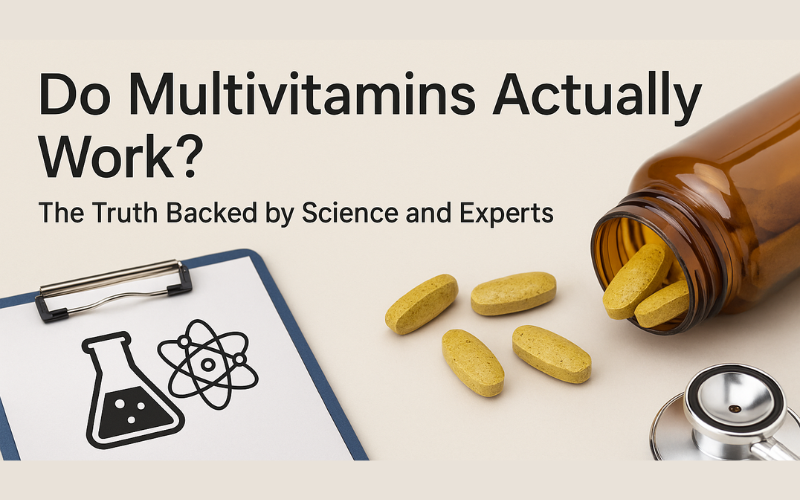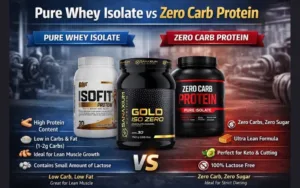No products in the cart.
Return To ShopDo Multivitamins Actually Work? The Truth Backed by Science and Experts
Multivitamins are one of the most popular dietary supplements worldwide. Found in medicine cabinets, gym bags, and even school backpacks, they promise to bridge nutritional gaps, boost energy, and support overall well-being. But the central question persists: Do multivitamins actually work?
While the market for vitamin supplements continues to boom, health professionals and scientists remain divided. Some studies point to real benefits in certain populations, while others highlight minimal effects. In this article, we’ll break down what multivitamins are, examine the science, and provide a balanced, evidence-based perspective on their effectiveness.
What Are Multivitamins?

Multivitamins are dietary supplement that combine various essential vitamins and minerals into a single pill, capsule, powder, or gummy. They typically include:
- Vitamins A, C, D, E, K
- B-complex vitamins (B1, B2, B3, B6, B12, folate, biotin, pantothenic acid)
- Minerals like calcium, magnesium, zinc, selenium, iron, and iodine
Purpose and Marketed Benefits
Multivitamins are marketed to:
- Fill daily nutritional gaps
- Improve immune function
- Enhance energy and metabolism
- Support heart, brain, eye, and bone health
They are often tailored for specific groups—such as children, pregnant women, seniors, and athletes—with customized formulas.
Scientific Evidence: Do Multivitamins Work?
Several large-scale studies have investigated whether multivitamins actually work:
- The Physicians’ Health Study II (Harvard, 2012): Found an 8% reduction in total cancer risk among men who took a daily multivitamin for over a decade, but no significant effect on heart disease.
- NIH Panel (National Institutes of Health): Concluded that there’s limited evidence to support multivitamins for chronic disease prevention in healthy individuals.
- Cochrane Reviews (2022): Suggest no consistent evidence that multivitamins reduce mortality or major diseases in the general population.
Proven Benefits
- Filling Nutritional Gaps: For individuals with poor dietary intake, multivitamins can help maintain adequate nutrient levels.
- Deficiency Prevention: Supplements may prevent conditions like anemia (iron, B12) or rickets (vitamin D) in at-risk groups.
Limitations and Null Results
- No clear evidence they prevent heart disease, cancer, or cognitive decline in healthy adults.
- Some effects seen in specific subgroups, not the general population.
Demographics That May Benefit
- Pregnant women: Folate and iron are crucial.
- Elderly individuals: Vitamin D and B12 absorption decreases with age.
- Vegans and vegetarians: Often deficient in B12, iron, or zinc.
- People with certain medical conditions or on restrictive diets.
Expert Opinions and Case Studies
Dr. JoAnn Manson, a leading researcher in preventive medicine at Harvard, states: “Multivitamins are not a magic bullet, but they may have modest benefits in certain populations.”
Registered Dietitian Sarah Pflugradt notes: “Whole foods should come first, but a multivitamin can be a useful backup—especially for people who don’t meet daily nutrient recommendations.”
Real-World Testimonials
- Case Study: Elderly Male (Age 68): After starting a multivitamin containing B12 and D, his lab values normalized, and he reported better energy levels.
Multivitamins vs. Whole Foods

Nutrients from whole foods are typically better absorbed and come with synergistic compounds like fiber, antioxidants, and phytonutrients that aren’t found in pills.
- Example: Vitamin C from an orange is more bioavailable than from a tablet.
The Risks of Relying Solely on Supplements
- May lead to a false sense of security.
- Cannot replicate the complexity and balance of a nutritious diet.
- Overuse may result in nutrient imbalances or toxicity.
Potential Risks and Overuse
While multivitamins are generally safe, high doses of certain fat-soluble vitamins (A, D, E, K) can accumulate and become toxic.
- Vitamin A toxicity can cause liver damage and birth defects.
- Excess iron can be dangerous for men and postmenopausal women.
Drug Interactions
Some vitamins interfere with medications:
- Vitamin K can affect blood thinners like warfarin.
- Calcium can reduce absorption of thyroid medications.
Always consult your healthcare provider if you’re on long-term medication.
Who Might Benefit from Multivitamins?
While not everyone needs a daily multivitamin, certain individuals can benefit:
- Pregnant and breastfeeding women
- People over 50
- Individuals with restricted diets (vegan, keto, etc.)
- Those with chronic health conditions (celiac disease, IBD)
- People recovering from surgery or illness
In these cases, supplementation supports recovery and ensures nutritional adequacy.
Myths vs. Facts
Myth: “More Vitamins = Better Health”
Fact: High doses of vitamins can be harmful. Your body excretes excess water-soluble vitamins like C and B12, but fat-soluble vitamins can build up and cause toxicity.
Myth: “Everyone Needs a Multivitamin”
Fact: If you eat a balanced diet rich in fruits, vegetables, grains, and lean proteins, you may not need one.
How to Choose a Good Multivitamin
Look for Certifications
- USP (U.S. Pharmacopeia)
- NSF International
- ConsumerLab.com
These ensure the product contains what it claims and is free from harmful contaminants.
Read the Label
Avoid supplements with:
- Megadoses (more than 100% of the Daily Value)
- Unnecessary fillers, dyes, or artificial additives
- “Proprietary blends” without clear dosages
Choose Age- and Gender-Specific Formulas
Different life stages have different nutritional needs. Choose a best multivitamin for adults, seniors, or children based on your age and gender.
Conclusion: Do Multivitamins Actually Work?
Do multivitamins actually work? The answer is nuanced.
If you’re eating a balanced diet and have no deficiencies, multivitamins may offer little benefit. But if you’re part of a group at risk of nutrient shortfalls—due to age, diet, medical condition, or pregnancy—multivitamins can be a valuable tool for maintaining health.
Discover science-backed multivitamins that truly work — shop now at SportsOne and support your health the smart way!









Add comment